What is a Descriptive Essay?
The goal of a descriptive essay is simple, choose a subject and describe it. The subject could be anything:
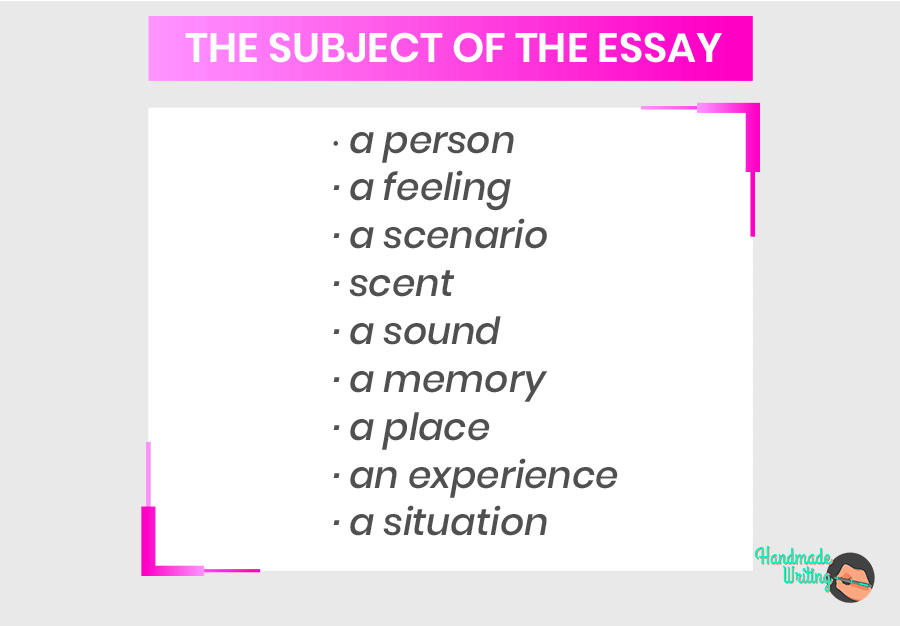
A descriptive essay is all about describing the subject in great detail. Being a type of expository writing, it gives you great freedom to paint a picture with your words, shares a once in a lifetime event with the reader or makes them feel something. It is better to choose a descriptive essay topic that has lots of qualities to discuss for example a person might have a more interesting feature to describe than a paper towel. Choose a subject you connect with emotionally or have a personal history with. The best descriptions come from retelling an experience.
The Difference Between Descriptive and Narrative Essays
The main difference between descriptive and narrative essays lies in the structure and purpose of the essay. A descriptive essay is used to describe a subject to present a clear picture of it. As such, it only requires you to describe the item in a logic fashion. A narrative essay’s purpose is to tell a story. As such, it requires a plot and logical progression to an outcome. A person’s face can be the subject of a descriptive essay. But it would be hard to write a narrative piece that follows the person’s face as the central plot of a story.
Showing VS Telling
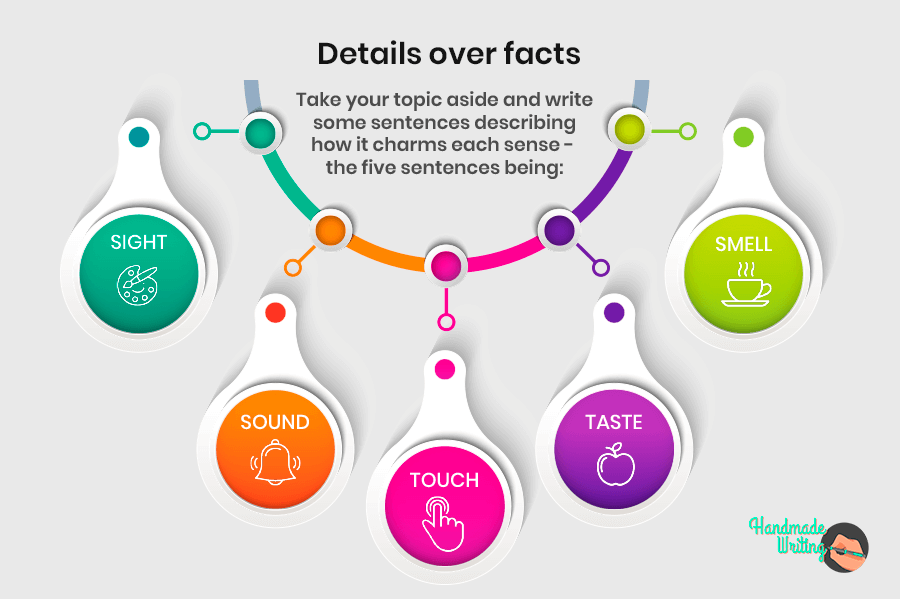
A descriptive essay values details over facts. This is also known as showing vs. telling. To show something is to describe using the five senses, how it looks, how it smells, how it tastes, how it feels and how it sounds. Imagine the reader as an alien, who has never experienced the subject for themselves. How would you describe it then?
To give you an understanding of how to differentiate between showing and telling I’ll write an example of a descriptive paper that describes my favorite place.

The above example tells you, as it doesn’t evoke any of your senses. It is a senseless description. It’s vague and hard to imagine.

This description is more detail and easier to imagine because of the following changes:
- The choice of words like ‘haven’ instead of ‘like’ add a showing element as it is showing in what way I like the library.
- Putting describers before items like ‘brightly colored’ books makes it easier to see.
- And choosing words with more like ‘towering’ instead of ‘tall’ makes the description less full.
- The description of the books shows what they do, not what they are. These are important points to consider when writing a descriptive essay.
A good exercise for descriptive writing and is to read descriptive essay examples and pick out the words that do the four points outlined above. Analyzing other’s descriptive writing will make your own descriptive work stronger. Can you pick out another place in the descriptive essay example above where those four changes occur and what it lends to the description?
Still having problems with your descriptive paper? All you need is to request help from our top-notch essay writing service and our essay writer make it for you !
How to Choose a Descriptive Essay Topic?
When deciding what to highlight about your topic, take a step back and look at what draws you to it. A campfire has bright, flickering colors, a satisfying crackling sound, and a sort of flow as it moves from the bottom to the tip of the flame. Place yourself in proximity to the subject and describe the parts that stimulate your senses the most.
Title Examples of Descriptive Essays
Here are some examples of descriptive essay topics that are fun to write:
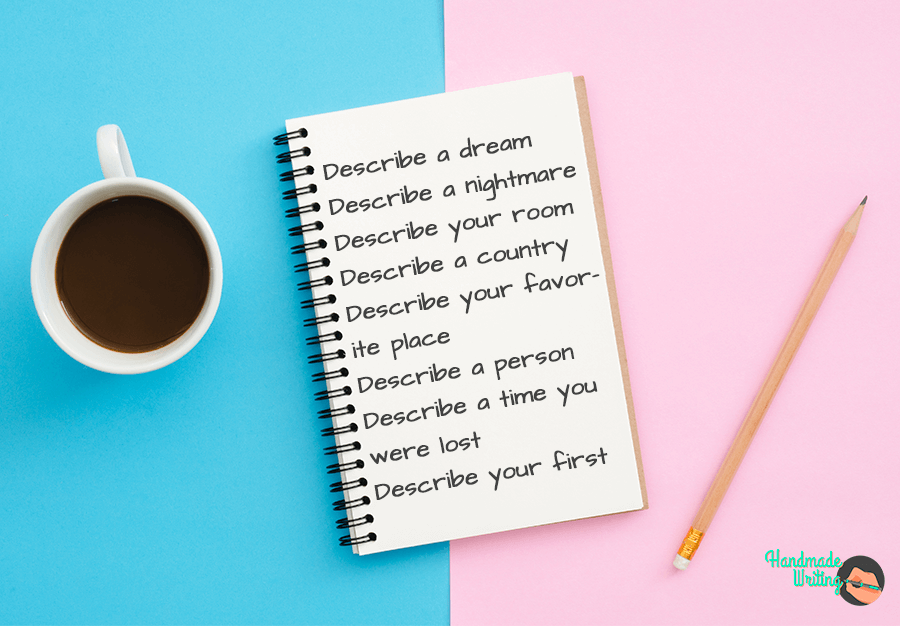
Pick something you can see right now and think about how you’d describe that.
Related Posts: Argumentative essay topics| Compare&Contrast essay topics
How to Set Up a Proper Description?
Slow down and think about what you want to invoke. Don’t rush into a description or you’ll likely end up with something weaker than you could have. Take your topic aside and write some sentences describing how it charms each sense – the five senses being:
- Touch
- Sound
- Sight
- Taste
- Smell
Keep a thesaurus on hand to switch some of the more basic words out. If you can read your paragraph back and vividly imagine the item you’ve described, you’ve done it.
How to write a Descriptive Essay Outline
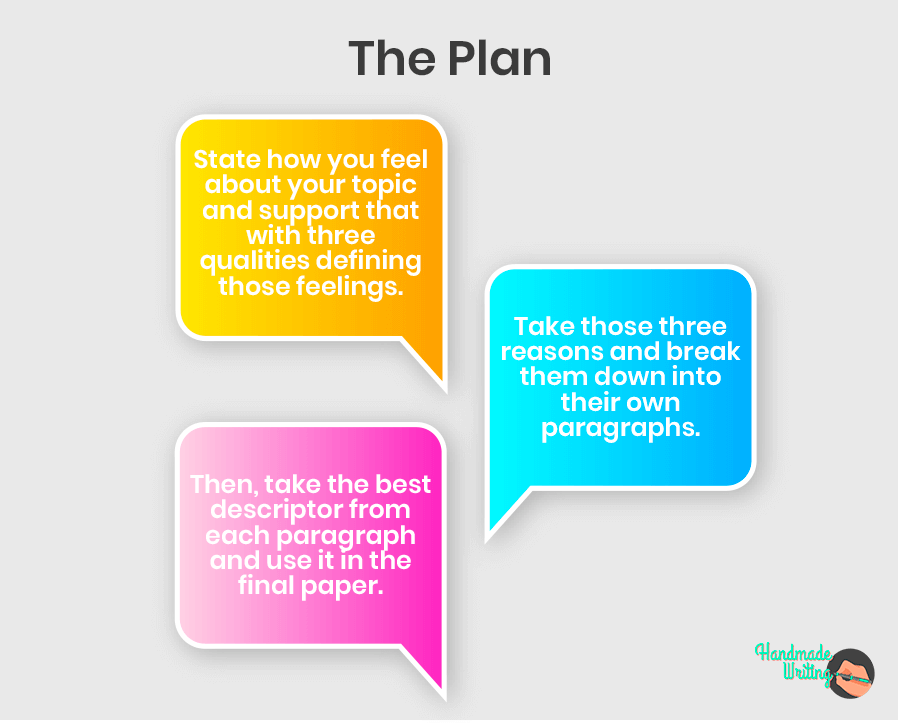
Starting your descriptive essay without a plan can lead to a messy and sprawling description. Learning to outline your ideas is just as important as knowing how to write them.
Related Posts: How to write an Essay outline | How to write an Essay introduction
Creating an Introduction for a Descriptive Writing
Once you have chosen the subject to write you need to plan the introduction for your descriptive paper. An introduction needs to include a thesis statement and three features of the thing you are describing. The introduction should start with a thesis statement that states how you feel about your topic. This should then be supported with three qualities defining those feelings.

These thesis statements aren’t meant to be complex. All they’re meant to do is to set up your reader for your descriptions. It is important to include three reasons that you can expand on describe in great detail as they will form the paragraphs of your descriptive paper.
Planning and Writing the Body of a Descriptive Essay
Looking at your thesis statement, take those three reasons and break them down into their own paragraphs. Describe hanging out with your friends at the beach, talk about the food you’d eat, the activities you’d participate in. Detail what huskies do when they’re energetic, what shows that they get along with other dogs?
It helps to write about each way you can describe an item on a separate sheet of paper. Use that sheet as your descriptive essay outline. Take each item and write what sense you can use to describe the item in each paragraph.
For example, if you want to talk about eating a popsicle on the beach you could include how cold against your tongue for touch, that it smelt and tasted like raspberries, it was a bright red, and shaped like a rocket for sight, and the sound you made it as you bit on it, or the sound you made as it rocketed into your mouth. Expand this into a paragraph keeping the most vivid description.

Force your reader to imagine these objects in their head. Help them visualize it, pour your vision into the paper and focus on both the small and the big details. Just don’t go overboard. It’s important to have a few great descriptors rather than a ton of average ones.
When describing an object, go about it in a practical sense. Don’t just throw details on the page, talk about them in order. Describe a mountain from its peak to it’s middle all the way down to its base. You wouldn’t go from the middle to the base to the peak, would you? This way, you’re keeping your reader engaged with the topic.
Concluding a Descriptive Essay
Concluding descriptive writing is easy. All you have to show why the subject you described is important to you. All you have to do is show the reader what you implied. Show why it has meaning, and why they should care.
Descriptive Essay Example
Descriptive essay
Drafting Your Essay
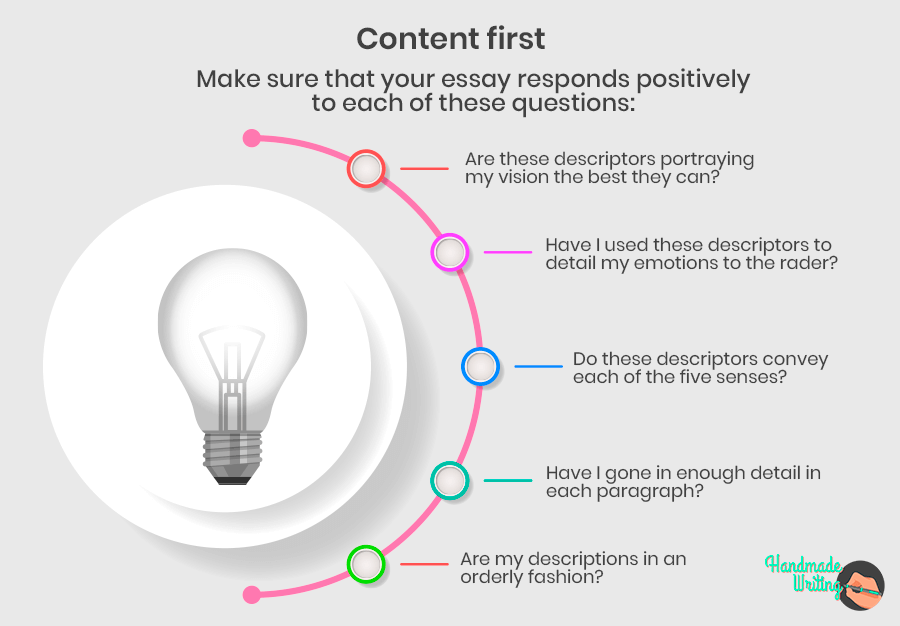
Where the organization comes to fruition. When writing your essay, keep the reader in your head at all times. Constantly as yourself: “Is this vivid enough?” Don’t focus much on grammar, get the content onto the paper.
Questions to Ask Yourself
Once you’ve finished writing your essay, read it back and make sure it responds positively to each of these questions:
- Are these descriptions making my writing visual? Could I make them more vivid?
- Have I used these descriptions to detail my emotions to the reader?
- Do these descriptions convey each of the five senses?
- Have I gone into enough details in each paragraph?
- Are my descriptions in an orderly fashion?
If you believe your essay fits these criteria, then you’re good to go on the content side.
Perfecting the Essay

Read it through a couple more times. Take some time away from it and then come back with a fresh mindset. Correct any grammar issues you see, and double check that it answers all of the questions mentioned above. Once that’s done, you’ll have an essay worthy of an A+ grade.
From Our Writers: Tips on How to Write a Good Descriptive Essay
- Be sensitive. Some writers are scared to show their true selves, but the point of a descriptive essay is to talk about how an object affects your senses and emotions. Keep this in mind during all stages of the essay.
- Put effort into unique descriptions. Don’t settle for standard words, spend some time searching out alternatives to common descriptive words. It will only help the reader envision your thoughts.
- Write about something that you care about. If you choose something you don’t have much personal experience with, you can’t truly write from the heart.















